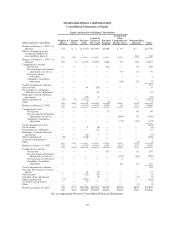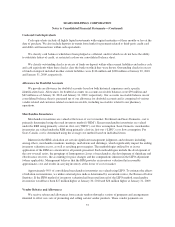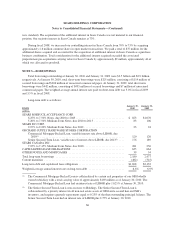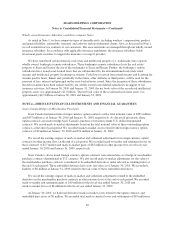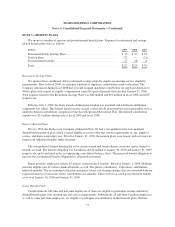Sears 2009 Annual Report Download - page 63
Download and view the complete annual report
Please find page 63 of the 2009 Sears annual report below. You can navigate through the pages in the report by either clicking on the pages listed below, or by using the keyword search tool below to find specific information within the annual report.SEARS HOLDINGS CORPORATION
Notes to Consolidated Financial Statements—(Continued)
repair, and home service and installation costs, customer shipping and handling costs, vendor allowances,
markdowns and physical inventory losses.
Selling and Administrative Expenses
Selling and administrative expenses are comprised principally of payroll and benefits costs for retail and
corporate employees, occupancy costs of corporate facilities, advertising, pre-opening costs and other
administrative expenses.
Pre-Opening Costs
Pre-opening and start-up activity costs are expensed in the period in which they occur.
Advertising Costs
Advertising costs are expensed as incurred, generally the first time the advertising occurs, and amounted to
$1.9 billion, $2.1 billion, and $2.2 billion for fiscal 2009, fiscal 2008, and fiscal 2007, respectively. These costs
are included within selling and administrative expenses in the accompanying consolidated statements of income.
Income Taxes
We account for income taxes in accordance with accounting standards pertaining to such taxes.
Accordingly, we provide deferred income tax assets and liabilities based on the estimated future tax effects of
differences between the financial and tax basis of assets and liabilities based on currently enacted tax laws. The
tax balances and income tax expense recognized by us are based on management’s interpretation of the tax laws
of multiple jurisdictions. Income tax expense also reflects our best estimates and assumptions regarding, among
other things, the level of future taxable income and tax planning. Future changes in tax laws, changes in projected
levels of taxable income, tax planning, and adoption and implementation of new accounting standards could
impact the effective tax rate and tax balances recorded by us.
Stock-based Compensation
We account for stock-based compensation arrangements in accordance with accounting standards pertaining
to share-based payment transactions, which requires us to both recognize as expense the fair value of all stock-
based compensation awards (which includes stock options) and to classify excess tax benefits associated with
share-based compensation deductions as cash from financing activities rather than cash from operating activities.
We recognize compensation expense as awards vest on a straight-line basis over the requisite service period of
the award.
Earnings Per Common Share
Basic earnings per common share is calculated by dividing net income attributable to Holdings’
shareholders by the weighted average number of common shares outstanding for each period. Diluted earnings
per common share also includes the dilutive effect of potential common shares, exercise of stock options and the
effect of restricted stock when dilutive.
63




